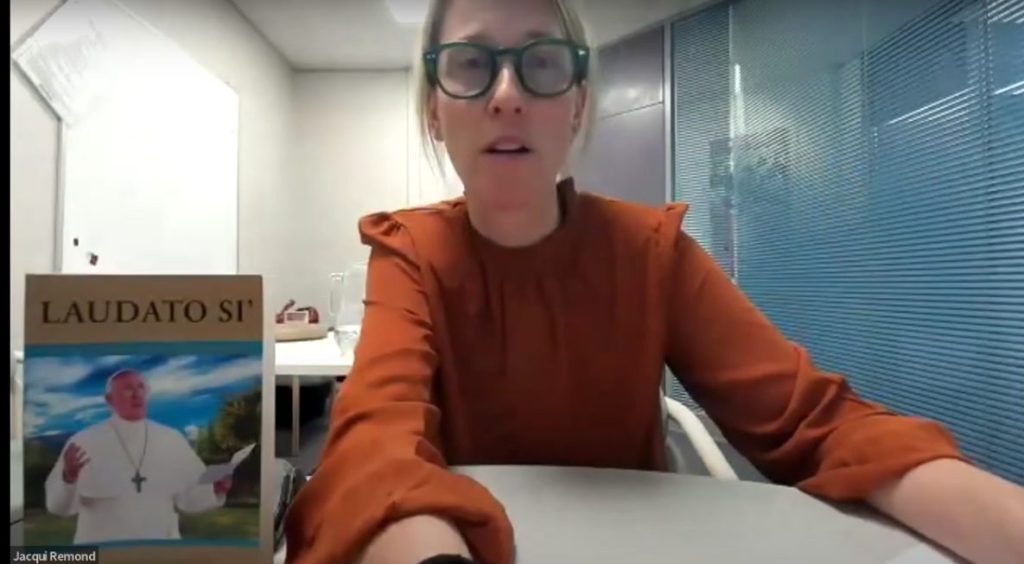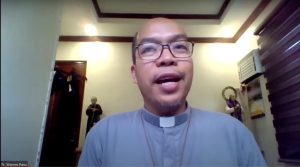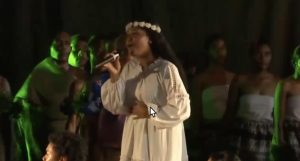On September 12th 2023, LSM organized a virtual session that transcended geographical boundaries, uniting participants across Oceania and Asia in launching the Fossil Fuel Non-Proliferation Treaty (FFNPT).
Words of Welcome, Words of Acknowledgement

Jacqui launches the event that gathered speakers and participants across Asia and Oceania.
With participants assembled, Jacqui Remond, a co-founder of the Laudato Sì Movement and lecturer on integral ecology at the Catholic University of Australia, introduced herself and extended a warm welcome to all attendees. She acknowledged the countries and First Nations present, emphasizing the importance of everyone’s connection to their land, air, and sea across Asia and Oceania and across all wisdom traditions.
Jacqui painted a stark picture of these challenges noting that “some of the speakers invited to this event weren’t able to attend,” citing instances where speakers couldn’t participate or make statements due to being “red-tagged.” This practice, she explained, involved branding individuals and organizations as supporters of the communist armed struggle, often used to intimidate environmentalists and indigenous communities.
Jacqui grounded the final moments of her welcome by inviting participants to watch Pope Francis’ video from September 1st, the Feast of Creation, in which the pontiff proclaimed “it is necessary to side with the victims of environmental and climate injustices, striving the end the senseless war against our common home,” like the speakers Jacqui had only recently named.
Storytelling: A story of Climate Change Impact from Asia and FFNPT Origin Story from Oceania

Fr. Warren Puno shares his story with all participants.
Brother John Din, national coordinator for LSM in the Philippines, introduced the first storyteller, Fr. Warren Puno, who shared his experience coal-fired power plants in the Diocese of Lucena, in the Philippines:
“The struggle that we have encountered here was land-grabbing. Since they will be putting a power plant, they will be needing 150 hectares of land. The residents living on that land have to leave their homes and relocate to housing provided by the company…This severs ties with their livelihood and relocates them to places with limited opportunities.”
Brother John then took the opportunity to introduce Fr. Eduardo Agosta Sacarel, climate researcher and Senior Advocacy Advisor for LSM, who emphasized the importance of a treaty to phase out the use of fossil fuels:
“Fossil fuels are like the cigarettes for our lung cancer and our world and our planet is suffering from lung cancer and we need to stop smoking these cigarettes. We need to end the era of fossil fuels.”
Philippa Rowland, one of the first signatories to FFNPT from Asia and Oceania, deepened the history of Religions for Peace’s support for the treaty.
“I felt it was very important to sign..because my own country, Australia, is still pushing for coal and gas projects despite clear evidence that our world cannot afford for us to do that and the true costs will fall upon many innocent lives and countries for subsequent generations.”
Participants were encouraged to watch the President of the Pacific Island of Vanuatu’s speech in May 2022. President Nikenike Vurobaravu, currently advocating for an ocean treaty, declared last May, “Every day we are experiencing more debilitating consequences of the climate crisis…This emergency is of our own making.”
Mitzi Salcedo, Sustainability Officer at Ateneo de Davao University, the Philippines, offered a youth perspective on the climate crisis, naming her concerns as her country continues to invest in fossil fuels at the expense of the poor.
Contemplating: On the Stories We Experienced through Song
After the engaging storytelling and declarations, Jacqui introduced a contemplative phase and encouraged participants to reflect while listening to Climate Change Lamentation, a song written by Archbishop Peter Chong and performed of Suva, Fiji and performed by a powerful choir with scenes of environmental devastation and renewal.

“Mother Earth is crying” sing the performers across the song.
The session then shifted to interpreting, focusing on policy responses. Brother John introduced a video of Bishop Jose Ramirez Rapadas III of the Diocese of Iligan, the Philippines, who presented himself as a concerned steward of the Earth:
“We find ourselves at a critical juncture where our actions can determine the fate of our planets for generations to come. The scientific consensus is clear and the signs of our planets distress are all around us: the melting glaciers, the rising sea levels, extreme weather events and the displacement of countless vulnerable communities… ”
These words were followed by a video of Bishop. Allwyn D’Silva of the Archdiocese of Bombay, India, who lauded the FFNPT and called upon governments to end the era of oil and gas and noted “we also require businesses, we also require communities, we want people who influence the policies and decision making in our countries,” to join that call.
Concluding in Dialogue: gathering
Brother John invited groups of four to five people to dialogue in small groups in reflection of the stories shared and the impact of FFNT in local and global contexts. In this phase, participants shared emerging insights and questions to better support the treaty in their communities in the chat among them:
“Renewed hope”
“Shared interest in promoting global solar energy between Australia and India”
“I have endless admiration for priests like Fr. Warren”
From these statements Jaqui asked participants to reflect upon what all can do to support the treaty further inviting participants to send questions and thoughts to [email protected]. A statement on FFNPT endorsement and future plans for the campaign in the region was also presented.
To conclude, Jacqui and Brother John expressed gratitude to participants and speakers.
This virtual session served as a beacon of hope, bringing together individuals from diverse backgrounds to collectively address the urgent climate crisis. It highlighted the importance of grassroots efforts, policy responses, and interfaith collaboration in tackling climate change.
The reflections and dialogues sparked during this session will undoubtedly ripple through communities, inspiring meaningful action for a more sustainable future.
See the full recording of the event here!
Wondering how to begin your own Season of Creation journey? View the events, guides, and opportunities available to you here!





